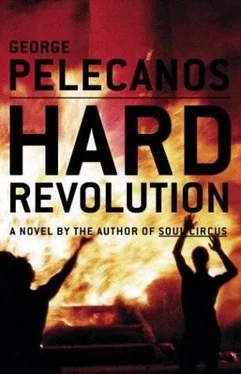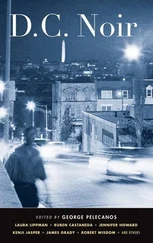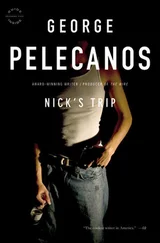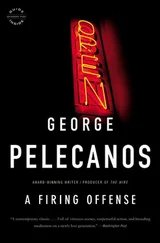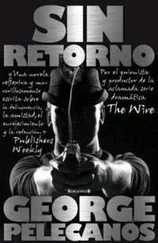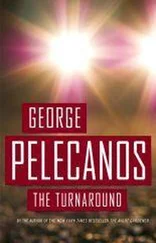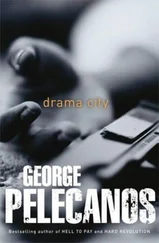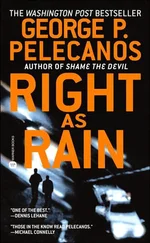“I wish I could have been there,” said Peters.
“Where?”
“The cathedral. I would’ve liked to have heard him speak.”
“Thought we were done with that,” said Strange.
“The radio said four thousand showed up to hear him,” said Peters, unable to give it up.
“Gonna be four hundred thousand,” said Strange, “he comes back in April.”
“First he’s gotta go back to Tennessee to try and put a Band-Aid on that situation they got down there.”
“Fine by me,” said Strange. “Let the Memphis police deal with it for a while. Leave us with some peace.”
He looked out the window of the squad car, saw a man washing his Cadillac curbside. A snatch of “Cold Sweat” came from its radio. Two kids were dancing on the sidewalk, one of them trying to do a JB split beside the man’s ride.
“Maceo,” said Strange under his breath.
Farther along, a woman in a gone-to-church outfit walked alone, swinging a handbag, her backside moving beautifully beneath her short skirt.
“What’d you say?” said Peters.
“I love this city,” said Strange.
BUZZ STEWART WALKED through an open bay door, stepped into the cool spring air, and lit himself a smoke. He had just finished changing the oil on a ’66 Dart, needed a break, and felt he was due. Behind him, from the garage radio, came that new one from the Temptations, “I Wish It Would Rain.” Now, that was a nice song.
“Day in, day out, my tear-stained face is pressed against the windowpane,” sang Stewart, soft and off-key, his eyes closed, the sun warming his face. David Ruffin on vocals, you couldn’t go wrong there. Course, Stewart couldn’t stand the sight of most niggers. But, boy,they could sing.
After Stewart’s discharge from the army, the manager of the Esso station at Georgia and Piney Branch had rehired him straightaway. Manager said he hoped the service had made a man out of him, and Stewart assured him that it had. Soon Stewart had been promoted to junior mechanic, a title that allowed him to do simple work: water pumps, belts, hoses, battery replacements, thermostats, and the like. No valve jobs, though, or even tune-ups, because the fat man still insisted he pass the certification course before he could take on those kinds of procedures. Stewart wouldn’t do it. He had long ago decided that he was never gonna sit in any kind of classroom again, have anyone laugh at him the way kids used to laugh at him back at St. Michael’s just because he couldn’t read the long words in those stupid books.
Manager said, “You take the class, you make full mechanic, it’s as simple as that.”
Stewart said, “Fuck a lot of class,” ending the discussion right there.
Stewart liked to work on cars, but he was no longer looking to make a career of it. There were easier ways to make money.
“Hey, Dom,” said Stewart, watching Dominic Martini scrape a rubber squeegee across the windshield of a ’64 Impala over by the pumps. “You missed a spot. How you gonna get employee of the month like that?”
“I dunno, Buzz,” said Martini without looking away from the chore at hand. He had to have known Stewart was cracking on him, but if it bothered him, he didn’t let it show.
“Just don’t want to see you get off that management track you’re on.”
“Thanks for lookin’ out for me, man.”
Stewart grunted. Martini was in his midtwenties, dark and pretty like Broadway Joe. He could have been a movie star, maybe, or one of them gigolos got paid to go on dates with old ladies, he wanted to. And here he was, a pump jockey, still cleaning windshields in the neighborhood he grew up in, a neighborhood gone half spade.
“Dumb ass,” said Stewart.
Dumb, maybe, but tough. Unlike Buzz Stewart, who had been stationed in the Philippines for the duration of his enlistment, Dominic Martini had seen Vietnam. Talk was his outfit had been involved in some real action, too. But Martini, who had been a cocky sonofabitch when he was a teenager, had lost something overseas. Funny how being in the middle of that shit storm had took the fire out of him. Or maybe it had something to do with his kid brother. The boy, Angelo, a weak tit if you asked Stewart, had always been his shadow when the two of them were growing up.
Whatever it was that had turned his lights off, and despite his lack of enthusiasm, Stewart had made Martini a part of his plans. He figured that if something went down, Martini would act without thought and also act with authority. After you’ve been programmed to kill, thought Stewart, the instinct never left you.
Martini had said that whatever Stewart had in mind was okay. He had said it without enthusiasm, like he said everything else, but agreed to come along. Stewart had brought Shorty in, too, soon as he’d done his straight time. Prison had made the little guy crazier than shit, and that could be useful, too. Not that he’d ever been normal or anything close to it. Walter Hess didn’t need no Marine Corps to teach him how to kill.
Stewart hit his smoke, hit it again, hot-boxed it so the paper collapsed under the draw. He crushed the cigarette under his boot. There was an Olds 88 in the garage beside the Dart, waitin’ on its tires to get rotated. It was time to get back to work.
He stopped by his car, a ’64 Plymouth Belvedere, double red with a white top, parked along the cinder-block wall of the garage. Stewart babied his ride, a customized 440 with a Max Wedge head scoop, Hooker headers, three-inch pipes, a 727 automatic trans, and chrome reverse mags. On the left front quarter panel, in white script, was written the word “Bernadette.” He’d named the car after one of his favorite songs.
Stewart noticed a smudge on the hood. He grabbed at the hip area of his belt line, where a clean shop rag always hung, and pulled the cloth free. He rubbed the smudge and removed it. Now she looked right.
WASN’T LONG BEFORE Stewart had the Olds up on the lift and was using an air gun to loosen the lugs on the wheels. The old lady who owned the car would be by soon to pick it up.
He had his sleeves rolled up high on his biceps, and as he worked he periodically checked his arms to regard their size. He had always been a big boy. The army had made him big like Kong.
Barry Richards, that fast-talking DJ on WHMC, introduced the brand-new Miracles record, “If You Can Want,” saying, “Go ahead, Smokey,” before the tune kicked in. It wasn’t no “I Second That Emotion,” but it was okay.
Walter Hess gave Stewart much shit about his newfound love of R amp;B. It was true that Stewart had been a rocker way back when, but something had changed in him early in the decade, when he started going to the Howard, down off 7th Street below Florida Avenue, to see the live acts with his friends. Most of the time they were the only whites in the place, but the colored kids were so into the show that there never had been any kind of trouble. None to speak of, that is, outside of the occasional hard look. Stewart always sat in the balcony, where he was less visible, just in case. Because of his size, he stood out too much as it was.
Early on, he caught the big-name acts. For fifty cents, in the early years, you got live performances and a movie, too. Comedians, sometimes, like Moms Mabley and Pigmeat Markham. But mostly musicians, and it was them he would remember most: James Brown and the Famous Flames, Little Stevie Wonder, Martha and the Vandellas, the Impressions, Joe Tex, and Aretha when she wasn’t much more than a little girl. Hell, she was so young then, her father had to be onstage with her, like a chaperone. Stewart had gotten tired of the hits he’d been hearing on the radio, especially that British shit, but what he saw at the Howard put a hot wire up inside him and got him buying music again.
Читать дальше
